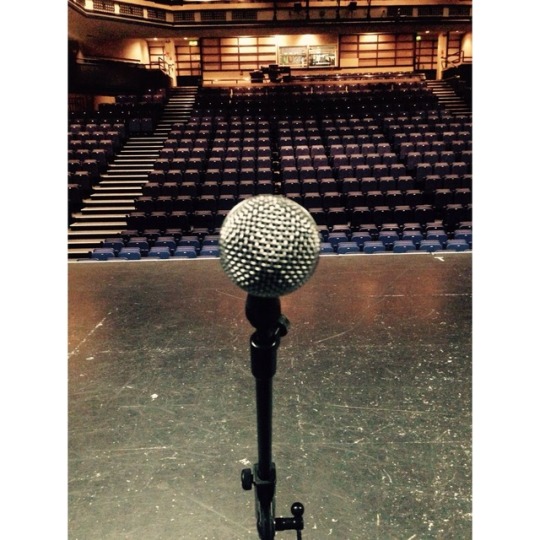This blog is all about planning for a public performance! I'm a musician and student. Enjoy my blog!
Don't wanna be here? Send us removal request.
Text
Roles Involved in a Music Project - Production Process

Planning Activities –
Audition and Employment
In terms of planning, it always starts with an audition with a musician, dancer or singer. An audition is used to sample individual’s talents in order for the appropriate people to decide whether they have what it takes to perform. Usually the performer would be given a set piece to perform which will be rehearsed and memorised by the performer to succeed at the audition. If the right performers are successful they will then be involved in a job interview, so the interviewer can assess how well they think the performer will cope with the intense tasks that they will be given.
Set and Light Design
A lighting designer works with the stage director, choreographer, set designer, costume designer and the sound designer where they will create the lighting atmosphere for the live performance. Usually there will be multiple production meetings with the designers, Stage Manager and Stage Director to discuss all the possible ideas for the show and also talk about budget and scheduling details. Once there is a final design the lighting designer with also ensure that they have an accurate plan in front of them as well as a copy from the set design. The Set Designer has the exact schedule and tasks as the Lighting Designer. Instead, they deal with ‘setting the scene’ for a live performance so scenery, mood, and connection with the audience is key for a successful live performance because they work with the musician or band to connect to their fans through the production and to keep them entertained.
Budgeting Planning
First of all, budgeting for a live performance has to be realistic and achievable. Then you have to think about where the money is coming from in terms of event financing. There is a lot of negotiating involved in budget planning for a live performance. These are all the aspects that a Stage Manager has to consider before even thinking of buying or setting up equipment for bands and artists.
Risk Assessment
Risk assessments are put in place to make sure venues and every department involved in the performance keeps all workers and productions safe by identifying the faults and difficulties, controlling the situation and result to eliminating occupational health and safety hazards onstage and offstage.
Equipment Testing
Testing equipment plays a critical role in all productions and performances, to ensure that all the equipment is of excellent quality and in good working order. Regular testing of the equipment is crucial in preparing for a performance as an amp would be working in the sound check but fuses could be blown by the time the performance is on so it is important for all the equipment is fully checked and especially to make sure that there are replacements just in case if something does go wrong, then that way they can replace it quickly and solve the problem before the audience notices.
Administrative Activities –
Promotions and Media and Press Coverage
The Artist’s responsibility is to have;
· WEBSITE
· MAILING LIST
· PRINT – printing well designed posters and flyers for an agent to distribute to venues.
· ADVERTISING – take out national advertising.
· PROFILE – send out review and radio copies of albums to establish and maintain a visible profile.
· INTERVIEWS – seek out opportunities to do radio interviews in conjunction with the venue.
· SOCIAL MEDIA – Maintain a presence on social media: facebook, twitter, tumblr etc.
Venue/Promoters responsibilities are;
· WEBSITE - Have a website. The same thing applies here as applied to artists. Don't just have a facebook page or a convenient page on someone else's site
· MAILING LIST - Maintain an active club or venue mailing list. Try and get an email address from everyone who steps through your door.
· LOCAL ADVERTISING
· LOCAL PRESS - Get local interest stories into the local newspapers. Build up a rapport.
· RADIO - Make contact with local radio programmes for incoming artists and pass on contact details.
· PRINT - Use the posters and flyers the artist has sent you. If you run a club you should be putting the flyers out on seats for several shows.
· SOCIAL MEDIA - Use social media: facebook, twitter, tumblr, (But as with the artist, this is no substitute for your own website or mailing list.)
· WORD OF MOUTH
It's the agent's job to look after the artist's diary, to find and get the gigs for the artist, to negotiate the contract. In addition, an agent will:
· Send out whatever physical publicity the artist has had printed.
· Should also have a website where a promoter can download images and text for a press release. (This may also be on the artist's website.)
· Supply a CD for radio or will pass the request direct to the artist.
· Forward all requests for interviews direct to an artist (or their management).
PRS
PRS to music collects the performance and mechanical rights for its members, this is for when they are performed publicly, or recordings are broadcast/played in a public space/s. PRS Music is run by the PRS board, owned by its members and provides services to the MCPS. After operating costs are taken off the profits are distributed amongst the members. Tariffs for organisations vary depending on the size and how much they are using music. All live music venues will require a PRS license however some places are exempt for example, buildings that are run by statutory bodies such as local authorities (e.g. county, district, town, borough, parish or similar councils), having said this some establishments play non-copyrighted music in order to avoid paying for a licence.
PPL UK
PPL is one of many collection societies in the UK that manage the rights and licence different types of copyrighted music material. PPL licenses the use of recorded music while others exist to manage rights in musical compositions, newspaper extracts, etc. Each of these organisations enable the user of these materials to obtain a licence, so both users and copyright owners can benefit from increased efficiency.
0 notes
Photo

Roles involved in a Music Project
Marketing and Promotion
Marketing and promotion is possibly one of the most important tools to an artist aiming to promote a live performance. Online marketing is widely used by millions of musicians and artists to promote events, live performances and upcoming albums as it is easily accessible to a larger audience than offline marketing. Although, there are most people that aren’t online and offline marketing reaches out to those people.
For a live performance online marketing and promotion is tasked with making sure that people attend the performance so helping a band or artist achieve that, they use a wide range of social networks including; Facebook and Twitter. These two social networking sites are the most important online tools for bands and artists and it’s the marketing and promotion teams job to make wider audiences aware that the artist/band their promoting is putting on a gig. Offline marketing is used for physical copies like CD’s, posters, business cards, merchandise and word of mouth.
Musicians
In live performances, musicians should always perform to the best of their abilities. They have to make sure that they can work and communicate with each other and everyone they will work with at the venue. As a standard musician is there to perform, they must have a good attitude towards the gig themselves just like you would do in a normal job as performing and entertaining is a job. By doing this, they need to be reliable and punctual especially arriving on time for sound checks, knowing the set and of course being well rehearsed. If the musician, artist or band doesn’t keep these simple tasks in check, they would not be able to perform to their best ability and the outcome of their performance will be recognised by the public and venue workers and could result into losing fans interest and possibly losing the chance to perform at the same venue in future.
Stage Manager
Stage managers are responsible for planning and organising what goes on before, during and after a performance. They are in charge of making sure the artist goes on stage on time and managing what goes on behind the scenes. Being a stage manager is very demanding and they find they’ll be doing tasks repetitively and it usually means that they have to work long hours to make sure nothing goes wrong.
Stage managers are there to prevent anything from affecting the production or performance taking place so attention to detail and good communication skills are key skills that they need to have in order to be able to manage everything that goes on stage. If the stage manager doesn’t do their job properly, possibly everything can go wrong. They work very closely with every department for example, lighting and sound engineers. Without communication, nothing would run smoothly during a live performance.
Lighting and Sound Engineers
A live sound technician or engineer is responsible for installing and operating the sound/audio equipment for live concerts. Their job includes managing the speakers, cables, mixing machines and other types of equipment used to capture sound during a live event.
When you work as a sound technician for live events, some of your specific duties might include setting up sound equipment before the event, taking down equipment after the event, synchronizing pre-recorded sound effects with live sound and working with performers and managers to achieve strong sound levels.
Lighting engineers are pretty much the same as sound engineers but their responsibility is to make sure that every light functions properly and is set up ready for the performance also creating effects and making sure that they stick to the plan regarding the lights and graphics. This plan is usually worked out with the artist or musician with the stage manager, venue manager and the lighting crew, everything must have a schedule and a plan as the artists want the audience to have the best experience out of the whole performance.
Venue Manager
Venue managers are responsible for the bookings of a venue. This involves marketing the venue, liaising with a range of clients, negotiating hire fees, and looking after the needs of the musicians who wishes to use a certain venue. The venue manager must make sure the venue is profitable. Other management duties may include financial reporting, pricing and staff supervision. The venue manager maintains a close relationship with musicians to ensure that their needs in terms of technical production, house services and box office are met. The venue manager liaises closely with other venue departments (technical production, venue programming, for example) to ensure the smooth running of the venue.
Security
Security guards or crowd control are very important for gigs as they not only keep the artist or band safe from hecklers or obsessed fans, they keep the audience safe as well by making sure they stop any illegal drugs or dangerous items coming into the venue. Their responsibility is to protect the artist or band from getting hurt or hurting others. As most live music venues are really energetic and head on, crowd management are there to stop anyone from acting or behaving to extreme at the venue.
0 notes
